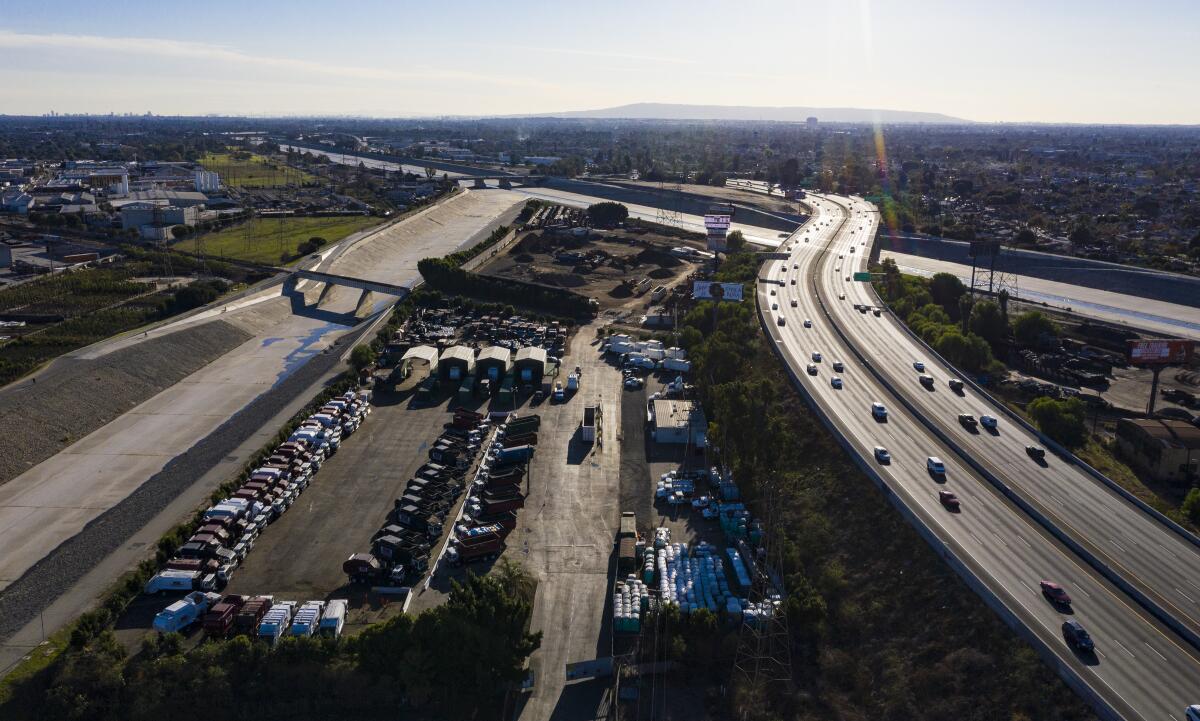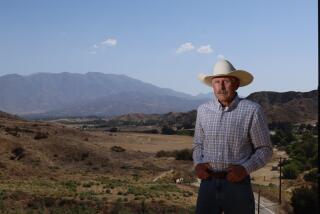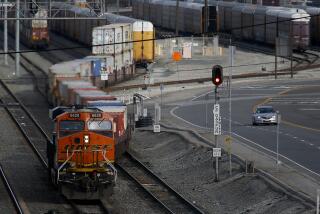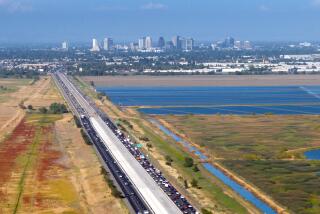710 Freeway is a key link in the U.S. economy, but pollution and evictions doom its expansion

It’s one of the country’s main commercial corridors, linking the ports of Los Angeles and Long Beach to America’s consumer economy. But the 710 Freeway is a congested and creaky relic straining to keep up with modern expectations.
For more than two decades, Southern California transportation officials have pondered how to accommodate the roadway’s swelling truck and automobile traffic, and they’ve always come to the same conclusion: We need a bigger freeway.
But their plans always run into the same obstacles. A wider 710 Freeway would likely mean even worse pollution for neighboring communities — including those in Long Beach, Lynwood and Bell Gardens — that suffer some of the nation’s worst air quality. And it would require gobbling up surrounding homes and businesses from predominantly low-income, Latino residents.
Now the project faces another, potentially even greater, complication. Federal environmental regulators recently found that the latest $6-billion proposal to expand the 710 Freeway might violate Clean Air Act standards, forcing state and local transportation officials to consider scrapping the effort and starting over with an entirely new approach.
“I don’t see how we can move forward with this project in its current format,” said Toks Omishakin, director of the California Department of Transportation, at a meeting last week of the California Transportation Commission. The project, Omishakin said, “is not aligning with the direction that we are taking at the state from a transportation standpoint, just plain and simple.”
Balancing the demands of expanding commercial traffic against the health needs of people living near the freeway has long been a challenge.
The southern portion of the 710 Freeway, a roughly 20-mile stretch that runs from Long Beach to Alhambra, is congested with diesel-spewing trucks that deliver imported furniture, auto parts, electronics and clothing across the country. Together, the ports of Los Angeles and Long Beach handle more than 30% of the nation’s waterborne containerized shipping traffic.
Currently, 50,000 diesel-fueled freight trucks and 165,000 other vehicles travel the freeway each day; bottlenecks are common. With port traffic expected to nearly triple between 2012 and 2035, the situation is only expected to decline.
If nothing is done, transportation officials warn in environmental documents, “roadways will get worse,” and this in turn “will have the potential to adversely affect the competitive position of the Los Angeles region in the global economy.”
But nearby residents urge planners to weigh the human cost. Already, those living near the 710 Freeway face high rates of asthma and other health disparities, with some referring to the corridor as “cancer alley.” Community groups for decades have fought plans to widen the freeway. An early 2000s effort to add double-decker lanes to the freeway would have displaced nearly 1,000 families and businesses.
The most recent proposal, advanced in 2018 by the Los Angeles Metropolitan Transportation Authority, would have widened 18 miles of the freeway, adding a lane for zero-emission trucks between Ocean Boulevard in Long Beach and the 60 Freeway in East Los Angeles and new truck lanes near the 405 Freeway. Additionally, two dozen ramps and multiple freeway interchanges would have been updated or rebuilt. To limit air pollution, Metro officials proposed funding a program to clean truck traffic by replacing diesel freight with low- and zero-emission alternatives.
But traffic estimates indicated that the plan would result in nearly 7,000 additional truck trips per day, adding air pollution. Plus, the effort called for the possible eviction of more than 100 families and 150 businesses.
“This project is environmental racism,” said Laura Cortez, executive director of East Yard Communities for Environmental Justice, one of a coalition of organizations fighting the project. “It’s a very clear depiction of that.”
In addition to the concerns about air quality and evictions, the project has long faced funding shortfalls. Sales tax hikes approved by county voters in 2008 and 2016 allowed Metro to budget $1 billion toward the expansion, leaving a $5-billion deficit.
Nevertheless, money problems aren’t what stalled the latest plan.
In March, regulators with the U.S. Environmental Protection Agency told Caltrans and Metro officials that the expansion would increase heavy-duty diesel freight travel, heighten pollution and violate federal clean air standards — even with the program to reduce truck emissions.
“We expect increases in the severity of existing violations even if the proposed I-710 Clean Truck Program were to be fully implemented given dust, tire wear and brake wear emissions,” wrote Elizabeth Adams, director of the air and radiation division at the EPA’s San Francisco regional office, in a letter to Caltrans and Metro.
In the letter, which was first reported by the Streetsblog LA website, Adams said the two agencies needed to further analyze air pollution concerns before continuing with the project.
Rather than doing so, the agencies say they’re reassessing the 710 Freeway expansion entirely. Omishakin, the Caltrans director, said he was troubled by the environmental justice concerns the project raised.
“This is not just an air-quality issue that we’re facing on this project,” he said. “The potential relocations to me are just as potentially problematic.”
Cortez said community members have consistently advocated for air-quality improvements along the 710 Freeway, and they’d still like to see cleaner emissions from trucks traveling on the highway from the ports.
But they believe any changes to the 710 corridor should not displace residents who, despite potentially receiving relocation payments, would likely be unable to find replacement housing nearby, given the region’s housing affordability challenges.
“Knocking down homes and small businesses is totally out of the question,” she said. “If you displace these people from their homes, there’s nowhere for them to go in L.A.”
Increasingly, federal, state and local highway officials are acknowledging the harm of pollution, relocations and other effects of road construction, especially on Black and Latino communities that have borne the brunt of such problems over time.
In his first days in office, President Biden released a memorandum pledging to address the nation’s history of discriminatory housing practices. The memo cites the building of the interstate highway system starting in the middle of the 20th century as a driver of ongoing racial inequality.
“Many urban interstate highways were deliberately built to pass through Black neighborhoods, often requiring the destruction of housing and other local institutions,” the memo said. “To this day, many Black neighborhoods are disconnected from access to high-quality housing, jobs, public transit and other resources.”
In public statements, Biden’s transportation secretary, Pete Buttigieg, has frequently cited this history and promised to reverse it.
Across Southern California, freeways that cut through predominantly Black and Latino neighborhoods — such as Interstates 5, 10, 105 and 110 — were completed, while those proposed to cross whiter, more affluent areas in Reseda, Laurel Canyon and Beverly Hills were blocked. The I-105 Century Freeway alone resulted in the displacement of 21,000 people.
The 710 Freeway is another example of this dynamic. Despite six decades of planning, wealthier, whiter communities in Pasadena and South Pasadena in 2018 were able to permanently halt further construction at the northern portion of the freeway through their cities. There’s now a 4.5-mile gap in the 710 corridor in the San Gabriel Valley between Pasadena and Alhambra.
L.A. Metro Chief Executive Phillip A. Washington said in a statement that the agency plans to invite community groups affected by the proposed expansion “to explore and create a set of principles that address the oftentimes disruptive harms created by major highway construction in both this region and in this country.
“We want to reframe the conversation,” Washington said.
More to Read
Sign up for Essential California
The most important California stories and recommendations in your inbox every morning.
You may occasionally receive promotional content from the Los Angeles Times.











